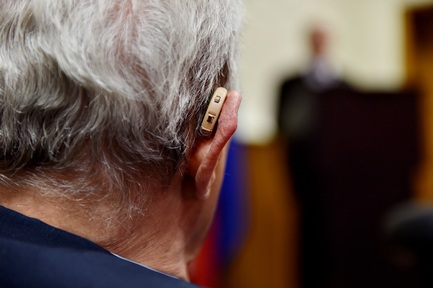Hearing loss in old age doubles risk of depression
Older people with age-related hearing loss have an increased risk of depression, new research suggests.

The findings, published online in JAMA Otolaryngology-Head & Neck Surgery, suggest that treatment of age-related hearing loss, which is under-recognised and under-treated among older people, could be one way to head off late-life depression.
Justin Golub, lead author and assistant professor at Columbia University, said: “Most people over age 70 have at least mild hearing loss, yet relatively few are diagnosed and much less are treated.
“Hearing loss is easy to diagnose and treat, and treatment may be even more important if it can help ease or prevent depression.”
The new study looked at more than 5,300 Hispanic adults over the age of 50. Each participant had an audiometric hearing test and a screening for depression.
Researchers found the odds of having 'clinically significant depressive symptoms' increased 45 per cent for every 20-dB increase in hearing loss (the sound of a whisper).
Individuals with mild hearing loss were almost twice as likely to have clinically significant symptoms of depression than those with normal hearing, while individuals with severe hearing loss had over four times the odds of having depressive symptoms.
Mr Golub added: “It's understandable how hearing loss could contribute to depressive symptoms. People with hearing loss have trouble communicating and tend to become more socially isolated, and social isolation can lead to depression.
“In general, older individuals should get their hearing tested and consider treatment, if warranted.”
Age-related hearing loss is the third-most common chronic condition in older adults. The condition is also known to raise the risk of other conditions, such as cognitive impairment and dementia.
Latest News
 29-Jul-24
Dementia Bus gives carehome.co.uk staff insight into life with dementia
29-Jul-24
Dementia Bus gives carehome.co.uk staff insight into life with dementia
 01-Mar-24
Find out the top care homes in 2024
01-Mar-24
Find out the top care homes in 2024
 21-Mar-23
UK's top care homes in 2023 revealed
21-Mar-23
UK's top care homes in 2023 revealed
 03-Jan-23
carehome.co.uk launches free care helpline
03-Jan-23
carehome.co.uk launches free care helpline
 13-Dec-22
5 mins with Emily Whitehurst, chief operating officer for Constantia Healthcare
13-Dec-22
5 mins with Emily Whitehurst, chief operating officer for Constantia Healthcare